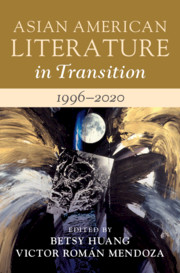Book contents
- Asian American Literature in Transition, 1996–2020
- Asian American Literature in Transition
- Asian American Literature in Transition, 1996–2020
- Copyright page
- Contents
- Illustrations
- Contributors
- Series Preface
- Acknowledgements
- Introduction
- Part I Neoimperialisms, Neoliberalisms, Necropolitics
- Chapter 1 Transpacific Ecological Imagination
- Chapter 2 The Garden in the Machine
- Chapter 3 Writing Asia-Latin America
- Chapter 4 States of Violence
- Part II Intersections, Intimacies
- Part III Genres, Modalities
- Part IV Movements, Speculations
- Bibliography
- Index
Chapter 2 - The Garden in the Machine
Grace Lee Boggs’s Living for Change: An Autobiography and Detroit’s Urban-Agrarian Future
from Part I - Neoimperialisms, Neoliberalisms, Necropolitics
Published online by Cambridge University Press: 27 May 2021
- Asian American Literature in Transition, 1996–2020
- Asian American Literature in Transition
- Asian American Literature in Transition, 1996–2020
- Copyright page
- Contents
- Illustrations
- Contributors
- Series Preface
- Acknowledgements
- Introduction
- Part I Neoimperialisms, Neoliberalisms, Necropolitics
- Chapter 1 Transpacific Ecological Imagination
- Chapter 2 The Garden in the Machine
- Chapter 3 Writing Asia-Latin America
- Chapter 4 States of Violence
- Part II Intersections, Intimacies
- Part III Genres, Modalities
- Part IV Movements, Speculations
- Bibliography
- Index
Summary
This chapter examines Living for Change: An Autobiography (1998), written by famed Chinese American activist Grace Lee Boggs, and considers this text’s status within the field of Asian American literary studies. As an autobiography that details Boggs’s activist history, including the history of state neglect in her home base of Detroit, and as a text that decenters Boggs’s experience as a Chinese American woman, Living for Change opens uncommon ground for Asian American literary inquiry. Rather than opening up questions around racial authenticity, the governing framework for Asian American autobiographical criticism, Boggs’s autobiography instead demonstrates how ethnic American autobiography might respond to the death-dealing force of urban infrastructural abandonment. It thus showcases the pliability of a generic category that has often proved vexing for scholars of Asian American studies. Taking its cues from Boggs’s text, which prioritizes her relationship to place over and above her Chinese American identity, this chapter furthers a framework of place-consciousness, proposed by scholar Karin Aguilar San-Juan, that considers forms of belonging both alongside and in excess of race and ethnicity. In so doing, it demonstrates how Living for Change expands dominant understandings of ethnic American autobiography’s cultural and political imperatives.
- Type
- Chapter
- Information
- Asian American Literature in Transition, 1996–2020 , pp. 36 - 55Publisher: Cambridge University PressPrint publication year: 2021



